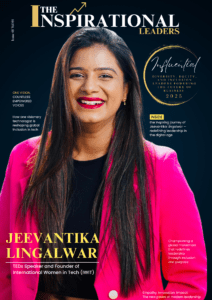In a rapidly transforming world, where technology connects continents and leadership is being redefined by empathy and inclusivity, Jeevantika Lingalwar stands as a guiding force. As a TEDx Speaker and Founder of International Women in Tech (IWIT), she embodies the essence of modern leadership — visionary, purposeful, and profoundly human. Recognized as The Most Influential Visionary Leader in Business 2025, Jeevantika has made it her mission to ensure that diversity, equity, and inclusion (DEI) are not just ideals discussed in boardrooms but lived realities shaping the future of business and technology.
The Calling to Lead with Purpose
For Jeevantika, being an influential leader in diversity, equity, and inclusion is not merely a professional pursuit — it is a personal calling. “It means standing at the intersection of purpose and progress,” she explains, “using my voice to challenge systems that weren’t built with everyone in mind.”
Her journey began with a realization that continues to define her mission today: “Talent is universal, but opportunity is not.” As a woman of color navigating the world of technology, Jeevantika often found herself as the only one in the room — sometimes, the only one ever. Rather than letting those moments limit her, she transformed them into a source of strength and motivation.
“I founded International Women in Tech to build a global community where women could connect, grow, and rise together,” she says. “It’s more than an organization — it’s a movement.”
For her, leadership in DEI requires courage and compassion. It’s about speaking up when silence is easier, advocating for change even when it’s uncomfortable, and listening deeply to those whose experiences differ from our own. “She highlights that real inclusion means more than simply having diverse faces at the table. “It’s about transformation — shifting mindsets, policies, and cultures so that diversity becomes the norm, not the exception.”
Through IWIT, Jeevantika has created a space where collective action becomes a catalyst for systemic change. The organization has launched mentorship programs, global summits, and grassroots initiatives that have empowered thousands of women to break barriers in technology. But for her, the most meaningful measure of success lies in the stories — “the woman who got her first job in AI, the founder who finally secured funding after years of rejection, or the student who saw herself reflected in leadership for the first time.”
“Being recognized as a DEI leader is an honor,” she reflects, “but it’s also a responsibility. I carry the hopes of those who came before me and the dreams of those still finding their way. My purpose is to keep building, advocating, and opening doors. Because when we lead with equity, we don’t just change business — we change lives.”
The Birth of a Global Movement
The inspiration behind International Women in Tech (IWIT) was deeply personal yet globally resonant. As a woman navigating the complexities of the tech world, Jeevantika experienced the subtle and overt biases that often hinder progress. “I encountered moments where brilliance was overshadowed by bias, and potential was stifled by lack of access,” she recalls. “It became clear that these were not isolated experiences — they were systemic.”
This awareness sparked the vision for IWIT — a global platform designed to amplify women’s voices in technology while equipping them with the tools, mentorship, and opportunities needed to lead. “I wanted to go beyond conversation and create a movement rooted in empowerment, representation, and measurable impact,” she explains.
While many DEI initiatives focus on raising awareness, IWIT focuses on action. It bridges borders and unites women from Lagos to London, Bangalore to Boston — all connected by the shared belief that empowerment must be both inclusive and intersectional.
“What makes IWIT unique,” Jeevantika says, “is our commitment to intersectionality. Women’s experiences in tech are shaped not just by gender, but by race, ethnicity, socioeconomic background, and more. We celebrate that complexity.”
The result is a movement that is rewriting the narrative of women in technology — shifting it from scarcity to abundance, from exclusion to belonging. “It’s not just about getting women into tech,” she insists. “It’s about ensuring they thrive, lead, and shape the future of the industry.”
Defining True Inclusivity
In her global advocacy work, Jeevantika often speaks about true inclusivity — a concept she believes must go far beyond token representation. “It’s not just about who’s in the room, but whether they have a voice and feel safe enough to use it,” she explains. “Inclusivity is the architecture of belonging, and it must be intentional, intersectional, and embedded into the culture.”
At IWIT, inclusivity is defined as equity in experience, not just opportunity. The organization’s programs are designed with sensitivity to the diverse realities of women across the world — from LGBTQ+ technologists and neurodiverse professionals to women from underrepresented geographies. “We don’t believe in one-size-fits-all solutions,” she says. “We build systems that reflect the complexity of human identity.”
This philosophy is brought to life through open dialogue, cross-border mentorship, and collaborative design. IWIT also partners with companies to help them move from performative gestures to measurable impact — implementing inclusive hiring practices, equitable pay structures, and leadership pipelines that mirror the diversity of their workforce.
“We challenge organizations to ask not just ‘who’s missing?’ but ‘why?’ — and to answer that question through action,” Jeevantika emphasizes. “Because when we build with everyone in mind, we build a future that belongs to everyone.”
The Power of Storytelling and Representation
For Jeevantika, storytelling is one of the most powerful tools for building inclusive environments. She recalls a pivotal moment early in her career when she spoke at a global conference on innovation. “I was the only woman on the panel — and one of the few people of color in the entire auditorium,” she shares. “After my session, a young woman came up to me and said, ‘I’ve never seen someone who looks like me on that stage. Now I know I belong here too.’”
That encounter crystallized her understanding of what representation truly means. “It’s not just symbolic — it’s transformational,” she says. “It’s not enough to be in the room; we have to change what the room looks like, feels like, and stands for.”
This realization inspired The Unpanned Journey, IWIT’s podcast that amplifies the voices and stories of women in tech around the world. Through candid conversations with founders, engineers, and innovators, the podcast captures the real and often untold journeys behind success. “We wanted to create a space where listeners feel seen and heard,” she explains. “Every story is a reminder that no journey is linear — and every voice matters.”
Storytelling, she believes, has the power to dismantle stereotypes, build empathy, and drive cultural transformation. “When we share our stories,” Jeevantika says, “we give others permission to do the same.”
Collaboration Beyond Borders
At its heart, IWIT is a borderless movement — one that thrives on collaboration across cultures and continents. From its inception, Jeevantika envisioned an organization where women from every corner of the world could find community and connection. “We designed IWIT to be inclusive by default, not by exception,” she explains.
Accessibility and cultural humility form the foundation of IWIT’s operations. Regional chapters are led by local women who understand the unique challenges and opportunities within their communities. “Our decentralized leadership model ensures that every region has a voice,” she notes. “It keeps us responsive, relevant, and rooted in real-world experiences.”
Cross-border mentorship has become one of IWIT’s most impactful initiatives — pairing women from different backgrounds and countries to learn from each other. Many of these connections have evolved into lasting collaborations, from startup ventures to advocacy campaigns.
“Technology is a connector, but it’s people who build trust,” she says. “We invest in shared values and storytelling because that’s what binds us together. When we bring diverse women together, we don’t just strengthen the tech industry — we shape a more compassionate future.”
Redefining Success and Innovation
Jeevantika believes that diverse leaders are redefining what success and innovation mean in the modern business world. “They’re not fitting into existing molds — they’re breaking them,” she says. Traditional measures of leadership, once dominated by profit and hierarchy, are giving way to more holistic definitions rooted in empathy, equity, and impact.
“Success today isn’t just about financial growth,” she asserts. “It’s about social progress, ethical leadership, and inclusive cultures.”
At IWIT, she has witnessed countless examples of diverse leaders driving innovation that benefits communities rather than just markets — engineers designing AI tools with cultural awareness, founders improving accessibility in rural regions, and women entrepreneurs building equitable hiring systems.
“Diverse leadership redefines innovation by asking different questions,” Jeevantika notes. “Instead of ‘How do we scale faster?’ we ask, ‘Who are we leaving behind?’ This mindset leads to more sustainable, human-centered innovation.”
Representation, she emphasizes, is not just inspirational — it’s transformational. “When people see leaders who look like them, they begin to imagine new futures for themselves. That ripple effect changes industries and societies alike.”
Turning Values into Measurable Impact
While many organizations speak about diversity, few succeed in making it measurable and sustainable. For Jeevantika, the difference lies in structure, accountability, and mindset.
“At IWIT, we treat DEI as a business imperative, not a side initiative,” she explains. “Equity must be embedded into every layer — hiring, product design, leadership, and culture.”
One of IWIT’s key strategies is data-driven inclusion — encouraging companies to track meaningful metrics such as representation across levels, pay equity, promotion rates, and retention of underrepresented talent. “Numbers tell a story,” she says. “They reveal both progress and blind spots.”
IWIT also promotes inclusive design thinking — a process that asks vital questions at every stage: Who is this for? Who might be unintentionally excluded? Why? This proactive approach ensures that inclusivity is part of innovation, not an afterthought.
Leadership accountability is another cornerstone. “What gets measured gets managed,” Jeevantika reminds. IWIT helps organizations create DEI scorecards and integrate them into executive reviews, making inclusion a shared responsibility rather than a symbolic one.
Finally, she emphasizes community-led solutions. “We don’t impose frameworks; we co-create them,” she says. “Sustainable change happens when those most impacted have a seat at the table.”
Balancing Purpose and Pace
Leading a global organization while maintaining a demanding professional life requires both discipline and purpose. For Jeevantika, balance comes from clarity. “I know why I do what I do — that sense of purpose fuels everything,” she says.
Her motivation is continuously renewed by the impact she witnesses daily — a mentee landing her first tech role, a company adopting inclusive policies, or a young woman realizing her leadership potential. “Those moments remind me why this work matters,” she reflects.
She also believes in the power of self-care and reflection. “Rest is a form of resistance, and reflection is a form of strategy,” she says with conviction. “Mindfulness, travel, and learning are not luxuries — they are leadership tools.”
Jeevantika practices what she preaches about inclusive leadership by trusting her teams and empowering others to take ownership. “Leadership isn’t about doing everything yourself,” she says. “It’s about creating systems where others can thrive.”
Ultimately, what grounds her is knowing she is part of something larger than herself. “IWIT isn’t just my story — it’s a global movement,” she reflects. “Every small step forward contributes to a future where equity is the expectation, not the exception.”
The Future of DEI: From Aspiration to Standard
Looking ahead, Jeevantika envisions a future where diversity, equity, and inclusion are not strategic add-ons but core business principles. “By 2026, I hope DEI is no longer a separate conversation,” she says. “It should be the lens through which every decision is made.”
For her, this transformation begins with systemic change — reimagining hiring pipelines to remove bias, holding leaders accountable for inclusive outcomes, and closing funding gaps for underrepresented founders. She also calls for greater investment in education and policy reform to make inclusion scalable and sustainable.
“The future of DEI lies in intersectionality,” she insists. “We must move beyond single-axis approaches and recognize how overlapping identities shape experiences. Inclusion must be nuanced, not monolithic.”
Her ultimate vision is simple yet profound: inclusion as the default standard. “When we integrate DEI into business metrics, product design, and leadership training, we unlock the full potential of human innovation,” she says. “That’s not just good for business — it’s essential for the future.”
A Message to the Next Generation of Leaders
To emerging leaders — especially women and underrepresented professionals — Jeevantika offers an empowering message: Your voice is not just needed; it’s transformative.
“You don’t have to wait for permission to lead,” she urges. “You don’t have to fit outdated molds. You are here to redefine them.”
She believes that inclusive leadership starts with authenticity — leading from one’s lived experiences and cultural identity rather than conformity. “Your story, your perspective, your difference — these are your strengths,” she says.
Her advice to future changemakers is both practical and heartfelt: find mentors, build community, and never underestimate the power of vulnerability. “Leadership isn’t about having all the answers,” she reminds. “It’s about asking the right questions, listening deeply, and growing continuously.”
And above all, she encourages boldness. “Don’t be afraid of failure,” she says with a smile. “Be scared of not trying.”
Leading the New Era
Through her work with International Women in Tech, her inspiring talks, and her unwavering commitment to equity, Jeevantika Lingalwar is helping redefine what leadership looks like in the 21st century. She represents a new era — one where compassion and courage lead the way, where inclusion fuels innovation, and where leadership is measured not just by success, but by impact.
Her story is a reminder that true leadership is not about standing above others, but standing with them — lifting voices, bridging divides, and building a future where everyone belongs.
In a world still learning how to lead inclusively, Jeevantika Lingalwar isn’t just part of the conversation — she’s shaping it.




